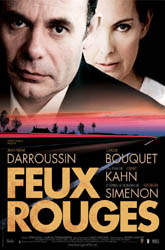 Director:
Cédric Kahn
Starring:
Jean-Pierre Darroussin
Carole Bouquet
Vincent Deniard
Charline Paul
Jean-Pierre Gos
Release: 20 Aug. 04
IMDb
|
Red Lights 
BY: DAVID PERRY
Last year I was part of the unexplainable Nashville
contingent that embraced Gespar Noé’s Irréversible. We all agreed that it
was a compelling storytelling experiment that showed the film Memento should
have been. We reveled in our simultaneous respect for the achievement and
disdain for the feelings the film brought in us.
I was especially convinced by Noé’s grasp of the lies he could tell by
having the film told in reverse. The false happy ending became a sick joke
-- the contentment of the characters were façades waiting to be destroyed in
the preceding scenes. Many people asked those of us who supported
Irréversible if the film would still be a good film if Noé had told it
chronologically. I never believed so because I thought the key to the
overall affect of the film was in its novel structure. I now have Red Lights
to prove me right.
This isn’t to say that Red Lights is as sadistically reprehensible as
Irréversible, but it does share a common story. However, instead of telling
everything in reverse, the narrative thrust is forward while the tension
remains at the beginning and the speciousness remains at the end. The film
never has a clear influence because the whole thing is too hard to believe,
and the complacency of director Cédric Kahn to change his cynical outrage
into veiled optimism is particularly distressing.
A French film about a couple driving along the countryside -- car wrecks all
around them as the country seems to fall apart -- has so much promise.
Instantly, memories of Godard’s final masterpiece Week-end begin to dance in
the mind of a cineaste. But these possibilities remain unfulfilled as the
film turns into a race for a progressively drunk French businessman (there
is wonderful use of La Defense in the film’s opening) trying to catch his
wife as she aborts a plan to join him on a drive to pick up their kids at
camp. His decline into a drunken stupor is, at times, marvelously captured
by Jean-Pierre Darroussin, but none of it really matters when the film seems
mostly intent on getting to the surprise climax (a surprise that actually
pretty predictable). The most inventive bit is Kahn’s use of the drunken
blackout to leave the audience and the protagonist in the dark for nearly
thirty minutes (and these thirty minutes are the best of the film), but the
rest is no more interesting than spending a night with a nauseous drunk and
his fumbling to get to a point.
 |

